How to Invest in UAE Stock Market

The United Arab Emirates continues to be a favorable environment for investors thanks to the excellent infrastructure, many attractions, and the region’s first-class hospitality. As a result, local companies are thriving also, leading to the year-on-year rise of the UAE stock market total index.
As an investor who has done his/her research very well and learned basic investing strategies, the UAE stock market could be a great place for you to start investing. If you are hearing the term “stock” here for the first time. Worry no more.
In this comprehensive guide, we will take you through all the crucial steps you’ll need to take to buy your first share that’s listed on the UAE stock market. Read on.
Before we proceed, we’ll need to lay down some foundations. You’ll often come across some of these terms in your investment journey as you navigate through the UAE stock market. At present, there are three stock exchanges in the United Arab Emirates, which are:
1. Dubai financial market (DFM)
2. Abu Dhabi securities exchange (ADX)
3. NASDAQ Dubai
The Securities and Commodities Authority (SCA) regulates and monitors these three stock exchanges. The SCA also offers investors information and resources necessary to make sound investment decisions, so they might warrant a quick peek once in a while.
Let’s have some insight into what the different exchanges bring to the table.
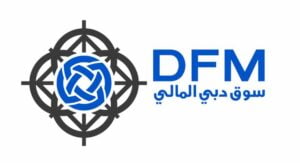
This institution is the first exchange in the UAE, established in the year 2000. It functions on Islamic principles, meaning companies listed on this exchange must operate within sharia laws and principles. DFM works with five core values of innovation, integrity, efficiency, confidentiality, and transparency.
Amlak Finance P.J.S.C
Damac Porperties
Dubai Islamic Bank DIB
Emirates Investment Bank
Emaar Properties
Emirates NBD
Oman Insirance Copmany
Du
Tabreed
See full list here>>
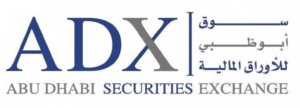
Likewise, established in late 2000, ADX trades in companies based in the UAE. It has branches in Sharjah, Fujairah, Al Ain and Ras Al Khaimah. On this exchange, you can find companies in various sectors such as hotels, insurance, banking. This variety is great if you want to diversify your investment portfolio for local companies.
Abu Dhabi Commercial Bank ADCB
Al Dar Properties
Bank of Sharjah
Emirate of Abu Dhabi
Etisalat
National Bank of Abu Dhabi
United Insurance Co.
See full list here>>
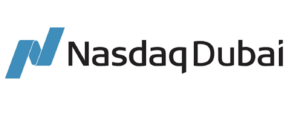
This exchange allows you to trade shares of Emirati companies and international companies. In addition, you can trade stocks, derivatives, Sukuk (Islamic bonds), conventional bonds, real estate investment funds (REITs), and tradable commodities. NASDAQ Dubai is subject to the Dubai Financial Services Authority (DFSA), and The Dubai Financial Market (DFM) owns two-thirds of its shares.
Al Baraka Banking Group
Depa Limited
Emirates REITs
ENBD REIT
Hikma Pharmaceuticals GDR
Nasdaq, Inc
Orascom Construction
See full list here>>
To invest in the UAE stock market, you need to do the following steps:
1. Apply for Investor Account NIN
2. Assign a Broker
3. Start Trading
4. Track your investments and dividends
The first thing you need to do to be able to start investing in UAE stock market, is to get an investor number (NIN).
To get your Investor number visit any of the three exchanges (the Dubai Financial Market, Abu Dhabi security exchange, or NASDAQ Dubai) websites and download a form to apply for your investor number (NIN). You can also get this application form on either of the three exchanges trading floors.
The required documents for obtaining an investor number (NIN) are the following:
With all the necessary documentation ready and the application filed, you’ll need to submit the documents at http://www.dfm.ae/ if applying online. If on the trading floor in the Trade Center, submit the required documents to the trading booths or Client Services Providers (CSD) if submitting your application in a foreign country manually.
Filling out the form online is very convenient, but it can take a day or two for your application to be processed and approved. However, if you visit the Client Services Affairs desk at the DFM trading floor, you’ll likely get your investor number on the same day you apply for it. DFM offices are open from 8 am to 2 pm, Sunday to Thursday. You’ll receive your NIN without charge and get it on the spot after your application is approved.
After acquiring the NIN number, you can then register for various brokers available in the UAE. You can find a long list of verified brokers at the DFM or NASDAQ Dubai website. The brokers will ask you for your NIN to create your trading account, and you can start trading stocks on their board. Most brokerage firms can also help you with the NIN application process – at a fee or a catch if you haven’t done so already.
The brokerage company acts as a mediator between you and the stock exchange. They will buy and sell shares on your behalf based on the level of service required, which determines the type of brokerage company you prefer. There are three levels of service:
Of course, you should choose your broker wisely because each has a different pricing system. Understand the type of investment you’re likely going to engage in and figure out if the broker is right for you. For example, if you want to invest for the long term in stock, such as ten years, transaction fees might not mean much to you. On the other hand, if you want to invest in the market quickly, such as day trading, transaction fees will matter a lot because charges can take from your portfolio significantly as you buy and sell frequently.
If you would like an advisor to help you to create a stock portfolio in UAE stock market, and manage it for you, drop us an email on info@thefinancedean.com
After obtaining the NIN and appointing a broker, you can monitor the market either through the trading app your broker provides, or through DFM market watch.
The DFM market watch is the list provided by the Dubai Financial Market where investors can see all details related to stocks listed in the UAE stock market in terms of prices, volume, number of trades, etc.
After deciding on the stock you are willing to buy, simply place the order through your broker’s app.
Through the trading platform provided by your broker, you can track your positions, check your profit/losses, and collect dividends paid to you by the companies. (Check out how you can withdraw the dividends in the FAQ section at the end)
You can conduct trading transactions during three periods categorised as:
On the trading floor, you’ll simply ask to buy or sell a particular share you own at the counters. However, on online trading platforms provided to you by a broker, they’ll act as proxies making the trade for you. Due to fast internet and fast-acting online trading applications, there isn’t a noteworthy time lag on the trade as it feels almost instantaneous.
As always, look at the real-time data and other valuable information you get, to gauge which price fluctuations you believe will happen. Also, monitor and track your trading performance to see whether you’re making the right decisions in the long term.
Indicators show that many UAE companies’ shares are considered the best for investment.
You can now get some shares listed below from the market. But, as earlier alluded to, you need to be familiar with the causes of stock price volatility and investment methods before investing. That said, here’s a list of companies that you could consider. Then, we explain why we picked them, so you can know what to look out for.
The Emirates bank is the oldest and the largest in the United Arab Emirates in terms of assets. It’s considered one of the largest financial institutions in the Middle East. The state established this bank in 1969 in the Emirate of Dubai to provide all financial and insurance services Back then, the UAE state-owned all its shares.
The enormity of Emirates NBD Bank is also evident as it employs more than 14 thousand employees of different nationalities. It also has many branches in many other countries. In 2007, the UAE government launched the Emirates NBD Bank’s shares on the Dubai Stock Exchange, with the symbol – Emirates NBD (ENBD).
The stock price of Emirates NBD has almost doubled through the past 5 years, from around AED 9 all the way to AED 17 at the time of updating this article in August 2023.
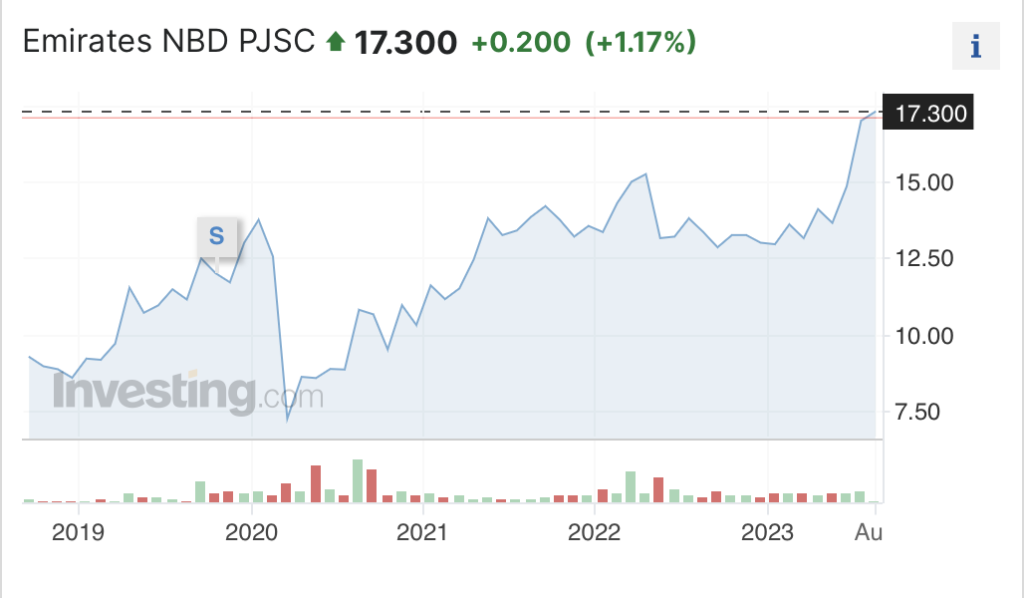
*www.investing.com
ADNOC works in energy extraction, logistical operations, shipping, and navigation. This state-owned oil company of the UAE shares was launched in 2017 on the Abu Dhabi Stock Exchange with the code (ADNOCDIST).
ADNOCs’ share value astoundingly continued to rise in 2020 despite the Covid-19 pandemic. And, when considering that the price of oil tanked due to travel restrictions, many believe this company’s valuation is set to increase.
The stock price of ADNOC has almost doubled through the past 5 years, from around AED 2.4 all the way to AED 4 at the time of updating this article in August 2023.
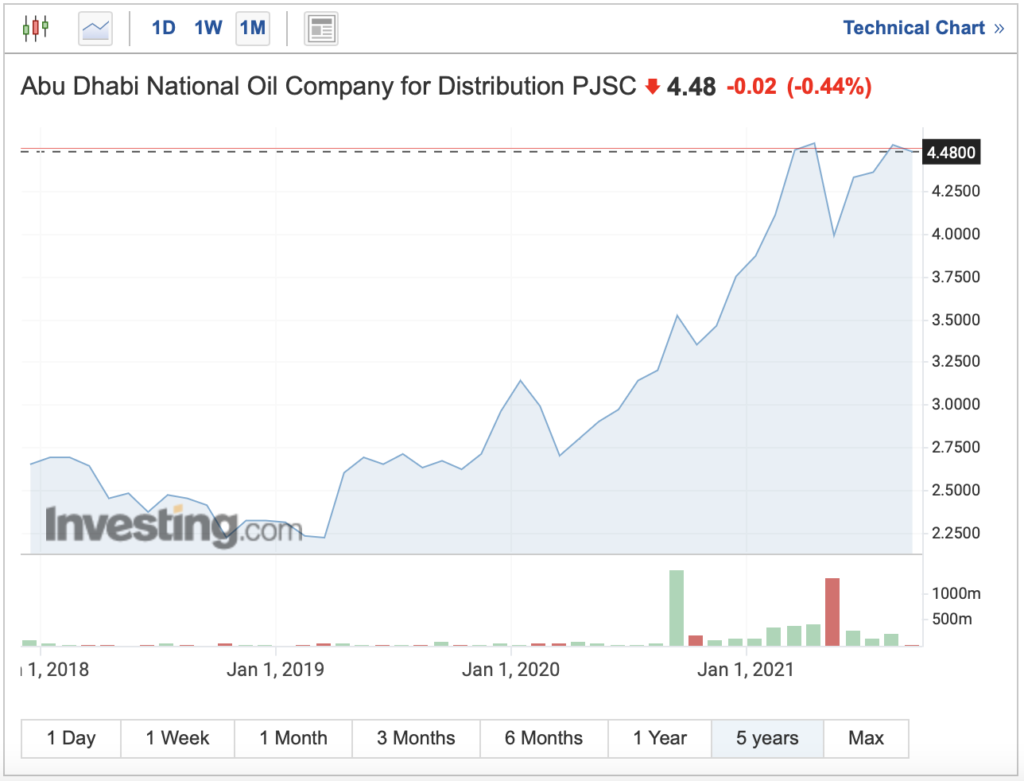
*www.investing.com
Tabreed is a leading international district cooling developer based in the UAE providing energy efficient, cost efficient and environment-friendly cooling solutions in the GCC region, India, and beyond.
Founded in 1998, and listed on the Dubai Financial Market (TABR), Tabreed’s cooling infrastructure is an integral part of the region’s growth. The company now delivers over 1.404 million refrigeration tons to major residential, commercial, government and private projects. Tabreed owns and operates 86 plants in its portfolio across the GCC, including 73 plants in the United Arab Emirates, three in the Kingdom of Saudi Arabia, and five in Oman, one in the Kingdom of Bahrain, and others in the region.
The stock price of TABREED has more than doubled in the past 5 years, from around AED 1.5 all the way to AED 3.8 at the time of updating this article in August 2023.
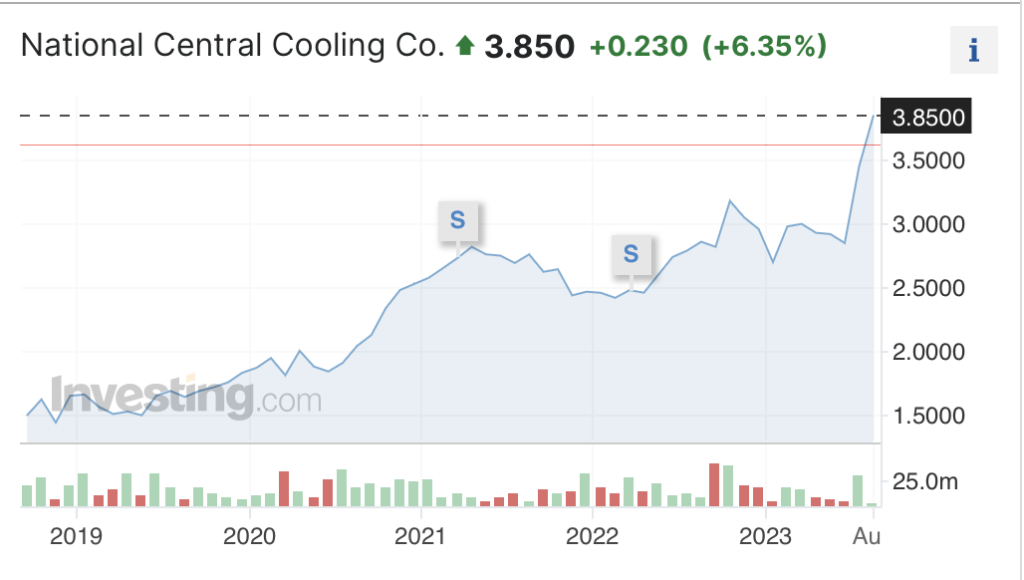
*www.investing.com
![]()
When listed companies pay dividends to the stock investors, dividends will be assigned to your account by your broker. However, you can choose to withdraw the dividends through the i-vestor card that DFM provides. It works such as a bank Debit card and you can withdraw your dividends from any ATM machine.
A stock or share is a unit of many units owned by a company. Companies offer and sell these units (shares) to investors to benefit from them as their price hopefully increases in value with time.
The company also benefits from the shareholders’ purchase of shares because they can allocate the funds into their projects. The company is divided into units of equal sizes, with each unit given the name share. For example, if a company is valued at 100 million Dirhams and offers all its shares to the market, it could split this value into smaller pieces. Therefore, say each share was 10 Dirhams, that would mean there are 10 million shares of that stock available.
Stocks are considered unstable, and it’s not possible to know when they will rise or fall. However, you can expect fluctuation due to several factors, of which the most important are
Take these factors into consideration, and you’ll be better in your decisions of buying or selling your stocks.
Many UAE stocks are on the up and are worth trying. Many have features not available to many other stocks, such as
This depends on how much you want to invest. For example, if you are not devoting a great deal of money, it makes sense to have a few shares in one company. Otherwise, it would be better to diversify your portfolio to reduce the risk of being stuck in a particular stock that may not do as well as others.
Yes, both residents and non-residents can trade on the UAE stock market with little documentation.
As with investing in the international stock market, always do your due diligence on the stock, sector, economic indicators, and market fundamentals.
Consider engaging a fund manager that can advise you on when to enter the stock market and what to invest in.
Investing in the UAE stock market has never been easier than it is right now, thanks to the numerous brokerage accounts offering online stock trading.
With a good plan, beginners in the UAE can start trading local shares and possibly grow their wealth. To be clear, the goal as an investor is to buy low and sell high. In some stocks, you can continue with your busy life as your money works for you, reaping the reward after some months or years.
Very informative thank you
Thanks Yahs. We are glad you enjoyed the article! also you can check out our blogs for a lot more topics!
Thank you so much for those valuable details.
I need to invest in the UAE stock market, but I am not a resident. Could you please guide me on how I can register and start trading.